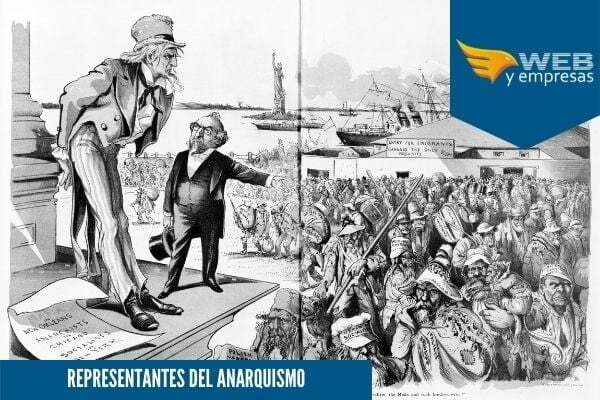Although anarchism was a political and social movement that emerged in the mid-nineteenth century, under the concept "without authority or power,” its main representatives are still remembered for their legacy.
Well, as a result of his theories and thoughts, other variants of the anarchist philosophical current have been developed.
Advertisements

His doctrine has been based on the status revocation and their dependent organisms, as a form of vindication of individual and collective rights above any imposition of authority.
Advertisements
Many political and social movements have called themselves followers of anarchist thought, but little is said about it. Who were the representatives of anarchism?
For this reason, we will dedicate this post to knowing who those most representative precursors of the anarchist movement were, Pierre Joseph Proudhon, Mikhail Bakunin and Piotr Kropotki.
Advertisements
From the theories of these three representatives, different anarchist movements have developed up to modern anarchism.
In this article you will find:
Pierre-Joseph Proudhon (1809-1965)
He was a French revolutionary writer, philosopher, politician, of humble origins, he considered the first theoretician of philosophical anarchism.
Advertisements
He stood out as a writer, he came to occupy the position of editor-in-chief of the newspaper El impartial and together with other partners he founded his own printing press; in which he published several outstanding works, but the one that took him the catapult of his fame was his work entitledWhat is property?Published in 1840.
In 1843 he publishes others of his works “The creation of order in humanity” and in 1846 he publishes "The system of economic contradictions or the Philosophy of misery” the latter strongly criticized by the renowned economist Karl Marx.
Advertisements
By 1848 he was already engaged in politics becoming part of the French Constituent Assembly. His ideas were based on the fact that authority should be removed as the guiding criterion of society, instituting that the radical individualism by ethical nature and a high moral sense would make individuals peacefully they will self-govern
He differed from the role of parliament, arguing that universal suffrage was influenced by the propaganda of bourgeois parties.
He was known as an anarchist, however; he fully believed in pacifism and mutual cooperation to achieve the liberation of man, being against the use of violence to achieve the anarchist purpose.
Other notable works in his career were, “revolutionary ideas” in (1849), “Of Justice in the Revolution and in the Church” in (1858) and “Of the political capacity of the working classes” (1863), among others.
Mikhail Bakunin (1814-1876)
He was a Russian philosopher, sociologist, revolutionary and the first anarchist political theorist to propose his thought in a more systematic way.
This anarchist of aristocratic origin, differed from the pacifist position that he suggested Pierre Proudhon, arriving toestablish the differences between anarchist and marxist movements, rejecting any possibility of a centralized state led by the proletariat or dictatorship of the proletariat.
Thus, he proposed “anarcho-syndicalism” by creating unions to replace the state, the army, and the church as forms of authority, he was in against revolutionary political parties and the role of parliaments as a means to achieve transformation Social.
He claimed, the dissolution of social classes, gender equality, atheism, common property of the earth and of every source of wealth.
Bakunin was one of the most influential representatives of the anarchist movements that emerged in the 20th century.
Throughout his career he wrote numerous works, which are grouped in volumes, the first two grouped under the title "The Social Revolution in France" published in (1870-1871), “Statism and Anarchy” published in (1873) and his most emblematic work “God and the state published in 1971.
Pyotr Kropotkin (1842-1921)
He was a Russian geographer, political theorist and writer of aristocratic origin, in favor of Bakunin's anarchist thought, was founder of the anarcho-communism school of thought and created the theory of mutual support.
defendedthe position of a stateless society and without any type of centralized institution, where mutual support and cooperation will be sought; forged on the foundations of freedom, justice and solidarity.
This representative of anarchism promoted the vindication of the rights of workers through the use of unions or voluntary associations of autonomous communities, as well as companies run by the working class.
Unions originated through the anarcho-communist movement which he defended, if necessary by means of violence in order to achieve the anarchist purpose.
Among the outstanding works of Kropotkin "The conquest of bread published in (1888), “Fields, factories and workshops” published in (1899), “Mutual help" in (1902) and “Memoirs of a revolutionary” published in (1906).
In these works he detailed libertarian communism, an influential ideology among anarchists in the late nineteenth and early twentieth centuries, which came to supplant the collectivism of Proudhon and Bakunin.


